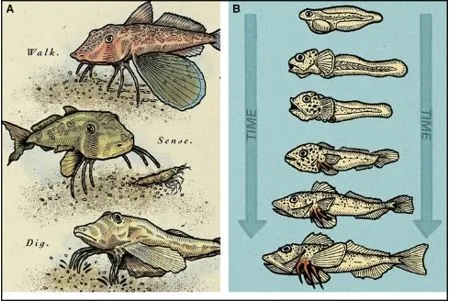

30th September 2024 (11 Topics)
Context
A recent study published in Current Biology has shed light on the evolutionary adaptations of Sea Robins, a unique species of fish known for their unusual "walking" abilities. This research is significant as it offers insights into the evolutionary pathways that led to the development of limbs in terrestrial animals, including humans.
About the Species: Sea Robins
- Sea Robins belong to the family Callionymidae, which includes several species of bottom-dwelling fish.
- Habitat: These fish are primarily found in tropical and subtropical oceans, residing at the seafloor where they feed on a diet of worms and crustaceans.
- Physical Characteristics: Sea robins are notable for their six leg-like appendages, which are actually extensions of their fins.
- These adaptations allow them to "walk" across the ocean floor, providing a unique method of locomotion compared to other fish.
- Feeding Mechanism: In addition to movement, some species of sea robins use their legs to taste prey hidden in the substrate, showcasing a fascinating evolutionary repurposing of their appendages.
- Genetic Connection to Humans: The study highlights that the genes responsible for the development of these appendages in sea robins are similar to those involved in the formation of human limbs. This connection provides insights into how ancient fish adapted to life on land and evolved into tetrapods—four-limbed animals, including humans.

More Articles


